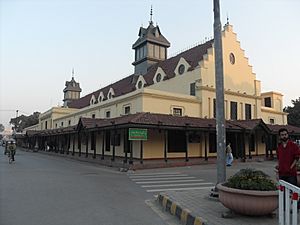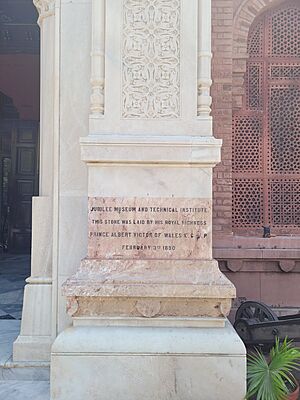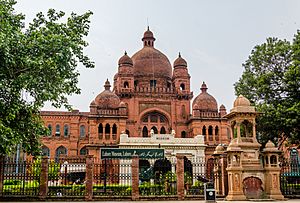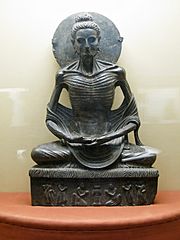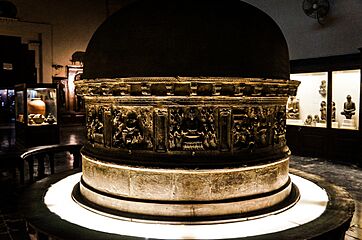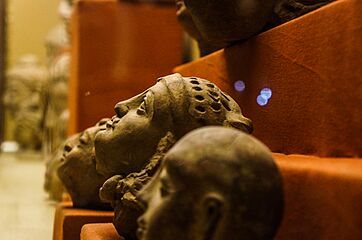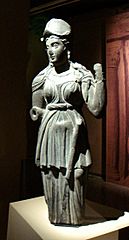Lahore Museum facts for kids
| عجائب گھر لاہور | |
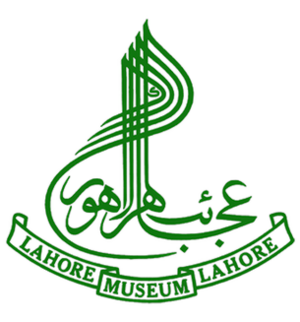 |
|
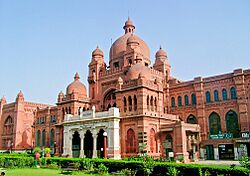
Entrance to the museum
|
|
| Former name | Central Museum |
|---|---|
| Established | 1865, moved to present site in 1894 |
| Location | The Mall, Lahore, Punjab, Pakistan |
| Type | Archaeology, art, heritage, modern history, religious |
| Collection size | 58,000 |
| Visitors | 227,994 (2018) |
| Owner | Ministry of Information & Broadcasting (National Heritage and Culture Division) |
| Public transit access | Civil Secretariat, Lahore Metrobus |
The Lahore Museum is a super interesting place in Lahore, Pakistan. It's one of the biggest and most visited museums in the country! It first opened in 1865 in a smaller spot. Then, in 1894, it moved to its current grand building on The Mall.
This museum is like a treasure chest. It holds amazing Buddhist art from ancient kingdoms like Indo-Greek and Gandhara. You can also find items from the Indus Valley Civilisation, the Mughal Empire, the Sikh Empire, and the time when the British ruled.
Did you know the Lahore Museum is famous in a book? It's mentioned in the beginning of Kim, a novel by Rudyard Kipling. Kipling's father, John Lockwood Kipling, was actually one of the museum's first managers!
Contents
A Look Back: The Museum's History
The Lahore Museum started in 1865-1866. Its first home was in the Tollinton Market building. This building was made for a big exhibition in 1864.
Later, a new, bigger building was planned. It was built to remember Queen Victoria's 50 years as queen in 1887. People raised money to build it. On February 3, 1890, Prince Albert Victor, Duke of Clarence, Queen Victoria's grandson, laid the first stone.
The new building was finished in 1894. All the museum's collections moved there. It was then called the Jubilee Museum. The building was designed by Bhai Ram Singh and John Lockwood Kipling. They created a special style that blended Indian and European designs.
After Pakistan became an independent country in 1947, the museum's items were divided. About 60% of the collection stayed in Lahore. The rest went to India and is now in a museum in Chandigarh.
From 1970 to 1990, the museum had a great time. Dr. Saif-ur-Rehman Dar, a smart scholar and archaeologist, was its director. He wrote many books about the museum.
The museum is very popular! In 2018, nearly 228,000 people visited it. It's a favorite spot for both local visitors and people from other countries.
What You Can See: The Museum's Collections
The Lahore Museum shows off items from many different times. You can see things from the Bronze Age (like the Indus Valley Civilisation) all the way to the Mughal Empire. It has one of the biggest collections of old objects, art, and crafts in Pakistan.
You'll find many Greco-Buddhist sculptures and beautiful Mughal and Pahari paintings. The museum has over 58,000 items! But only about 14,000 are on display at one time.
One of the most famous items is the Fasting Buddha. This amazing sculpture is from the Gandhara period. It shows Buddha during a time of deep thought.
The Story of The Evolution of Mankind
When you enter the museum, look up! The ceiling of the entrance hall has a huge painting called The Evolution of Mankind. It's made of 48 large panels. A Pakistani artist named Sadequain painted it in 1973.
Over the years, the painting got damaged by weather and tiny insects called termites. But don't worry! In 2008, money was given to fix it. Restoration work started in 2012, and by 2018, many panels were beautifully repaired.
The museum also has lovely carved wood from the Mughal and Sikh times. There are many paintings from the British period too. You can also see old musical instruments, sparkling jewelry, colorful textiles, pottery, and even ancient weapons. Some items from Tibet and Nepal are also on display.
Museum Leaders
Many people have helped lead the Lahore Museum over the years. Here are some of the directors:
| No. | Name | Role | Duration
(years) |
|---|---|---|---|
| 1 | John Lockwood Kipling | Curator | 18 |
| 2 | Fred Henry Andrews | Curator | 6 |
| 3 | Percy Brown | Curator | 13 |
| 4 | Hugh Lionel Heath | Curator | 7 |
| 5 | Rai Bahadur (S.N. Gupta) | Curator | 13 |
| 6 | Molvi Zarar Hasan | Curator | 5 |
| 7 | Malik Shams | Curator | 18 |
| 8 | Syed Muhammad Taqi | Curator/Director | 9 |
| 9 | Dr. Saifur Rehman Dar | Director | 19 |
| 10 | Dr. F.M. Anjum Rehmani | Officiating Director | 2 |
| 11 | Dr Saif-ur-Rehman Dar, | Director | 3 |
| 12 | Dr. F.M. Anjum Rehmani | Officiating Director | 3 |
| 13 | Mansoor Sohail | Director (Additional charge) | 1 |
| 14 | Dr. Liaquat Ali Khan Niazi | Director | 3 |
| 15 | Syed Gulzar Mashhadi | Director | 1 |
| 16 | Naheed Rizvi | Director | 3 |
| 17 | Asghar Nadeem Syed | Director | 1 |
| 18 | Dr. Kamran Afzal Cheema | Director | <1 |
| 19 | Muhammad Siddique Sheikh | Director | 1 |
| 20 | Salman Ijaz | Director | <1 |
| 21 | Humera Alam | Director | 2 |
| 22 | Sumaira Samad | Director | 4 |
| 23 | Syed Tahir Raza Hamdani | Director (Additional charge) | <1 |
| 24 | Humayun Mazhar Sheikh | Director | 2 |
| 25 | Saman Rai | Director (Additional charge) | 1 |
| 26 | Nasir Jamal Hotiana | Director | <1 |
| 27 | Tariq Mahmood Javaid | Director | 1 |
| 28 | Ijaz Ahmed Minhas | Director | 2* |
More to Explore
- List of museums in Pakistan
- Lahore: History and Architecture of Mughal Monuments
 | Valerie Thomas |
 | Frederick McKinley Jones |
 | George Edward Alcorn Jr. |
 | Thomas Mensah |


